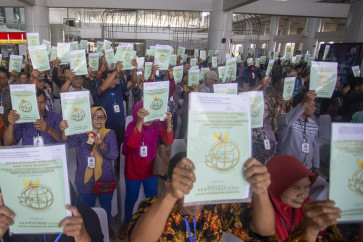Popular Reads
Top Results
Can't find what you're looking for?
View all search resultsPopular Reads
Top Results
Can't find what you're looking for?
View all search resultsCollaborative governance a pathway to resolving agrarian conflicts in RI
Political will is not enough to ensure the success of agrarian reform, particularly in conflict resolution, and requires the more comprehensive approach of collaborative governance that involves both civil society and vulnerable groups.
Change text size
Gift Premium Articles
to Anyone
 People hold up the land certificates they received on Jan. 26, 2024 during a comprehensive systematic registration program (PTSL) held at Kertajati International Airport in Majalengka, West Java, as part of the Agrarian and Spatial Planning Ministry’s aim to distribute 120 million land certificates by the end of 2024. (Antara/Dedhez Anggara)
People hold up the land certificates they received on Jan. 26, 2024 during a comprehensive systematic registration program (PTSL) held at Kertajati International Airport in Majalengka, West Java, as part of the Agrarian and Spatial Planning Ministry’s aim to distribute 120 million land certificates by the end of 2024. (Antara/Dedhez Anggara)
E
ncouraging political cooperation is crucial for effective governance in implementing agrarian reform. Collaborative governance is well-suited to agrarian reform in Indonesia, due to the country's fragmented land tenure system and the involvement of a wide range of actors, including governments, civil society organizations and corporations.
Collaborative governance can also help navigate the complexities of overlapping claims and conflicting interests in land.
Civil society and vulnerable groups, including small-scale farmers and indigenous communities, have long been excluded from meaningful participation in discussions on agrarian conflict resolution. This exclusion has allowed top-down policies, often shaped by elite interests, to exacerbate existing conflicts rather than resolve them.
In addition, land ownership inequality has worsened in the last decade, leading to more agrarian conflicts in many regions across the country.
The Consortium for Agrarian Reform (KPA 2023) noted that 2,710 cases of agrarian conflict occurred during the government of President Joko “Jokowi” Widodo. This significant number emphasizes an urgent need to address and rectify the deep-rooted structural inequalities through more effective and inclusive policies.
Therefore, collaboration between civil society organizations and the ministers in the next government of Prabowo Subianto could lead to meaningful cooperation, with both state and non-state actors uniting in collective forums with public agencies to engage in consensus-oriented decision-making.
Ansell and Gash (2008) refer to this as collective governance as “a governing arrangement where one or more public agencies directly engage non-state stakeholders in a collective decision-making process that is formal, consensus-oriented and deliberative and that aims to make or implement public policy or manage public programs or assets”.


















